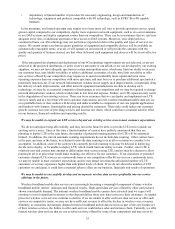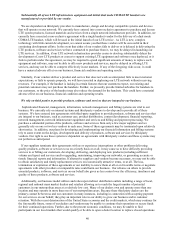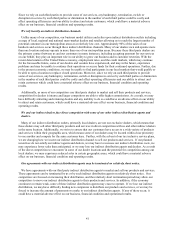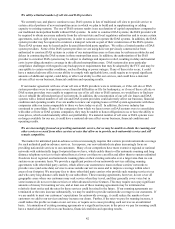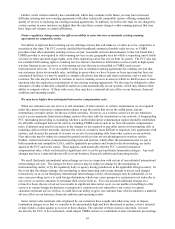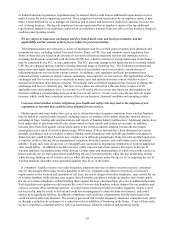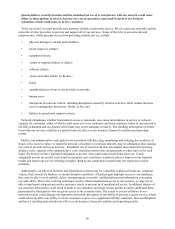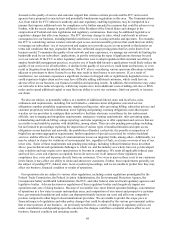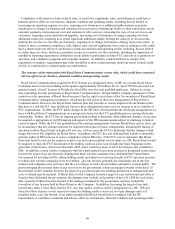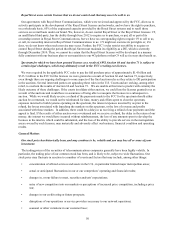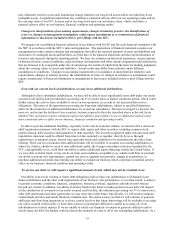Metro PCS 2009 Annual Report Download - page 57
Download and view the complete annual report
Please find page 57 of the 2009 Metro PCS annual report below. You can navigate through the pages in the report by either clicking on the pages listed below, or by using the keyword search tool below to find specific information within the annual report.45
of Federal and state legislatures, legislation may be enacted which could impose additional requirements on us or
make it easier for union organizing activities. If our employees become represented by an employee union, it may
make it more difficult for us to manage our business and to attract and retain new employees and may increase our
cost of doing business. Having our employees become represented by an employee union or having additional
requirements related to our employees imposed on us could have a material adverse effect on our business, financial
condition and operating results.
We are subject to numerous surcharges and fees from federal, state and local governments, and the
applicability and the amount of these fees is subject to great uncertainty.
Telecommunications providers pay a variety of surcharges and fees on their gross revenues from interstate and
intrastate services, including federal Universal Service Fund, or USF, fees and common carrier regulatory fees.
Some of these fees are based on the division of our services between interstate services and intrastate services,
including the divisions associated with the federal USF fees, which is a matter of interpretation and, in the future,
may be contested by the FCC or state authorities. The FCC also may change in the future the basis on which federal
USF fees are charged and may impose recurring spectrum usage or licensing fees. The Federal government and
many states also apply transaction-based taxes to sales of our products and services and to our purchases of
telecommunications services from various carriers. In addition, state regulators and local governments have
imposed and may continue to impose various surcharges, taxes and fees on our services. The applicability of these
surcharges and fees to our services is uncertain in many cases and jurisdictions may contest whether we have
assessed and remitted those monies correctly. Periodically state and federal regulators may increase or change the
surcharges and fees we currently pay. Our new service plans are offered on a flat-rate basis, inclusive of all
applicable taxes and regulatory fees. As a result, we will not be able to recover any future tax and regulatory fee
increases without a corresponding increase in the price of our service. So our cost to provide our services could
increase, which could have a material adverse effect on our business, financial condition and operating results.
Concerns about whether wireless telephones pose health and safety risks may lead to the adoption of new
regulations or lawsuits that could decrease demand for our services.
Media reports and some studies have given rise to claims that radio frequency emissions from wireless handsets
may be linked to various health concerns, including cancer, or interfere with various electronic medical devices,
including air bags, hearing aids and pacemakers and reports of handset battery malfunctions. Additional studies have
been undertaken to determine whether the claims based on these reports and studies are accurate. In addition,
lawsuits have been filed against various participants in the wireless industry alleging various adverse health
consequences as a result of wireless phone usage. While many of these lawsuits have been dismissed on various
grounds, including a lack of scientific evidence linking wireless handsets with such adverse health consequences,
future lawsuits could be filed based on new evidence or in different jurisdictions. If any lawsuits are filed against us,
it could be costly to defend, divert management’s attention from the business, and could subject us to substantial
liability. If any such suits do succeed, or if plaintiffs are successful in negotiating settlements, it is likely additional
suits would follow. In addition to health concerns, safety concerns have been raised with respect to the use of
wireless handsets, including texting, while driving. Certain states and municipalities in which we provide service or
plan to provide service have passed laws prohibiting the use of wireless phones while driving, prohibiting texting
while driving, limiting use of wireless devices while driving by persons under the age of 18, or requiring the use of
wireless headsets, and other states and municipalities may do so in the future.
If consumers’ health concerns over radio frequency emissions increase or safety concerns increase, consumers
may be discouraged from using wireless handsets or services, regulators may impose restrictions or increased
requirements on the location and operation of cell sites, the use or design of wireless telephones, may restrict the use
of wireless handsets while driving, may require that all wireless telephones include an earpiece that would enable
the use of wireless telephones without holding them against the user’s head and may give rise to additional lawsuits.
Such legislation or regulation could increase the cost of our wireless handsets, reduce demand for our products and
services, increase other operating expenses, or could expose wireless providers to further litigation, which, even if
not successful, may be costly to defend and could divert management’s attention from our business, and could
subject us to significant liability. In addition, compliance with such new requirements, and the associated costs,
could adversely affect our business. The actual or perceived risk of radio frequency emissions could adversely affect
us through a reduction in customers or a reduction in the availability of financing in the future. If any of these risks
occur, it could have a material adverse effect on our business, financial condition and operating results.


